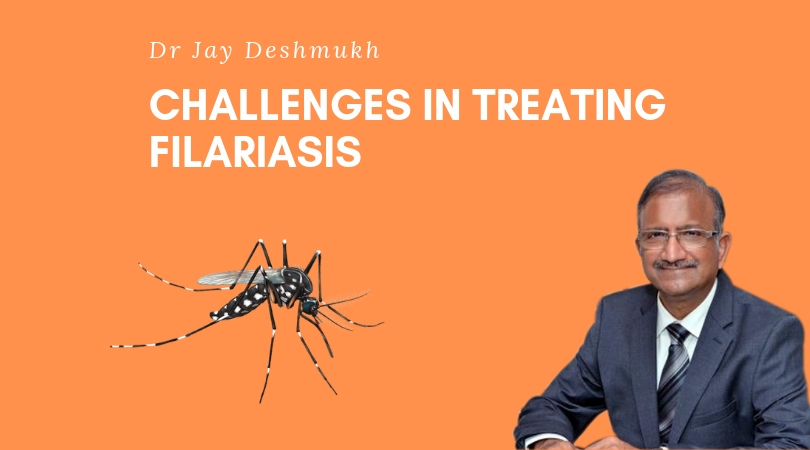Sunflower Hospital Nagpur:– Lymphatic filariasis is one of the most debilitating neglected tropical diseases. It presents basically with painful and incapacitating lymphoedema. Sunflower Hospital Nagpur Amongst the 68 million people infected, 36 million people are microfilaria carriers and 40million are symptomatic. Additionally, 946 million people in SouthEast Asia are at the risk of infection. In 2000, WHO launched the Global Programme to Eliminate Lymphatic filariasis, Sunflower Hospital Nagpur aims to interrupt transmission of lymphatic filariasis by 2020.
How does lymphatic filariasis occur?
Lymphatic filariasis is caused by infection with parasites. There are three types of thread-like filarial worms. Wuchereria bancrofti is responsible for 90% of the cases. Adult worms lodge in the lymphatic vessels and damage the lymphatic system. The worms can live for approximately 6-8 years and, during their life time, produce millions of microfilariae, which are immature larvae that circulate in the blood. Mosquitoes are infected by ingesting the blood of people with circulation microfilariae. When infected mosquitoes bite people, mature parasite larvae are deposited on the skin from where they can enter the body. These microfilariae then migrate to the lymphatic vessels where they develop into adult worms, thus continuing a cycle of transmission.
- What are the symptoms of filariasis? Most may be asymptomatic, to begin with. Fever, chills and body aches are common. Redness of the skin with subsequent tightening and swelling of the infected area occurs. There may be progressive oedema that is elephantiasis of the legs, arms, breasts and external genitalia. Long-standing oedema will make the skin very thick and may have a warty appearance. Involvement of a kidney can lead to milk like urine.
How was elephantiasis discovered?
- In 1863, French surgeon Jean Nicolas was the first to demonstrate microfilariae in fluid extracted from a hydrocoele. Sunflower Hospital Nagpur Three years later microfilariae in urine were demonstrated by Otto Henry from Brazil.
Can elephantiasis be reversed by treatment?
- Gross elephantiasis cannot be reversed at all. The lymphatic fluid that needs to be emptied in the veins is not allowed to happen because of lymphatic obstruction by the microfilariae. This leads to obstruction of lymphatic function leading to swelling of the organ involved. Effective treatment in the early phases can prevent elephantiasis.
How is filariasis diagnosed?
- Though the classical features of fever, swelling and redness of the organ involved and the painful lymph nodes draining the part is an unmistakable diagnostic clue, demonstration of the microfilariae in the blood can be done. These organisms come out in blood only at night. Taking a blood smear late at night may be impracticable. Antigen testing in the blood is the method of choice to diagnose filariasis. This is a simple and accurate blood test and can be done at any time of the day or night.
Can filariasis be prevented?
- Avoidance of mosquito bites through personal protection measures or community level vector control is the best option to prevent filariasis. Periodic examination of blood for infection and initiation of recommended treatment are also likely to prevent clinical manifestations.
What is the treatment for filariasis?
- Sunflower Hospital Nagpur Diethylcarbamazine, Ivermectin and Albendazole are useful for mass drug administration to treat filariasis and thus also to prevent its spread. DEC is one of the safest, effective and inexpensive drugs available to treat filariasis. It is safe even in pregnancy. It is known by the name of Hetrazan or Banocide forte in our country.
What is the outlook in filariasis?
- Elephantiasis is a disease spread by mosquitoes. Prevention may be possible by avoiding mosquitoes or preventing their bites. Getting rid of mosquito breeding areas, using mosquito nets or wearing insect repellents, wearing long-sleeved pants or shirts, taking DEC, albendazole and Ivermectin as a preventive treatment before travelling to areas prone to infection.
What are recent efforts taken by our Government to eradicate filariasis?
- To make our country filariasis free, the Centre has started a single dose of triple drugs to eradicate filariasis. These three drugs are DEC, Ivermectin, Albendazole. Four districts in the whole of our country have been selected. Nagpur is one of them and the only District from Maharashtra chosen. The biggest challenge seems to be the lack of awareness and minimum attention given to lymphatic filariasis by people at large.
Filariasis is a very common parasitic disorder in our country. It can lead to irreversible giant swelling of our legs and hands. If recognised and treated early it may not lead to elephantiasis. In order to contain these unpleasant disease efforts are being made at all levels Preventing mosquito bites and administration of a single dose of triple medicines is a very practical way to contain this disease. Elephantiasis can lead to loss of self-esteem, depression and anxiety. It may also lead to a decrease in physical capability to carry out any fruitful activity. Prevention is better than cure holds true for this ailment aptly.
Author: Dr Jay Deshmukh
Dr Jay Deshmukh is Chief Physician and Director, Sunflower Hospital, Nagpur Honorary Physician to Honorable Governor of Maharashtra and PondicherryCentral. Dr Jay Deshmukh is an M.B.B.S., M.C.P.S., F.C.P.S., M.N.A.M.S., MD From Internal Medicine – Bombay and New Delhi.


